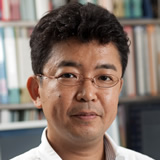
Professor, The University of Tokyo
Chief Scientist, Quantum Metrology Laboratory, RIKEN Advanced Science Institute
Hidetoshi Katori
Educational Background
- B. Eng. in Applied Physics (March/1988), Faculty of Engineering, The University of Tokyo
- M. Eng. in Applied Physics (March/1990), Graduate School of Engineering, The University of Tokyo
- D. Eng. in Applied Physics (October/1994), Graduate School of Engineering, The University of Tokyo
Professional Experience
| 1991.8-1994.9 | Research Associate, Department of Applied Physics, The University of Tokyo. |
| 1994.10-1997.3 | Visiting scientist, Max-Planck-Institute for Quantum optics, Garching, Germany. |
| 1997.10-2002.9 | Group leader, ERATO Cooperative Excitation Project, Japan Science and Technology Agency (JST). |
| 1999.4-2005.3 | Associate Professor, Engineering Research Institute, The University of Tokyo. |
| 2005.4-2010.4 | Associate Professor, Department of Applied Physics, Graduate School of Engineering, The University of Tokyo. |
| 2005.10-present | Principal Investigator, CREST, JST. |
| 2010.5-present | Professor, Department of Applied Physics, Graduate School of Engineering, The University of Tokyo. |
| 2010.10 | KATORI Innovative Space-Time Project Research Director |
| 2011.4 | RIKEN Advanced Science Institute Quantum Metrology Laboratory Chief Scientist |
Award
- Marubun Research Award (2001)
- European Time and Frequency Award (2005)
- The first JSPS Award (2005)
- Julius Springer Prize for Applied Physics (2005)
- Marubun special science award (2006)
- The 20th IBM Japan science prize (2006)
- Rabi Award (2008)
- 42th Ichimura Academic Award, Special Prize (2010)
- The 12th Optical Quantum Electronics Achievement Prize (Takuma Hiroshi Award) (2011)
- The Commendation for Science and Technology by the Minister of Education, Culture, Sports, Science and Technology (Research Category) (2011)
- Philipp Franz von Siebold-Preis (2011)
- The Asahi Prize (2012)
Research Topics
- Quantum electronics (experiment): quantum measurement/metrology, atomic clock, ultracold atom physics.



